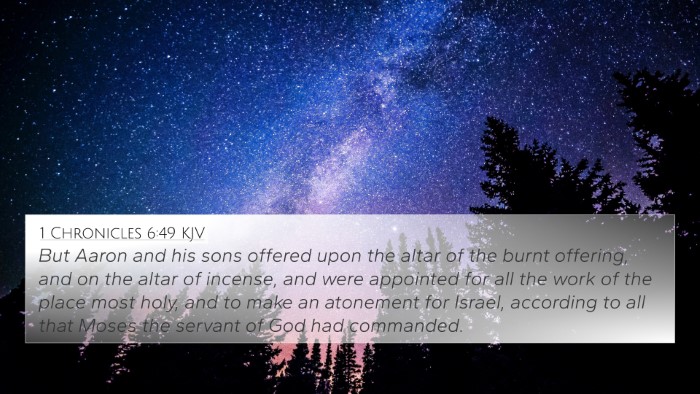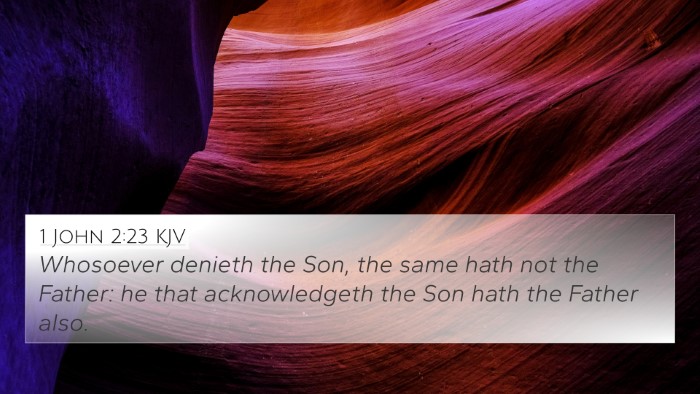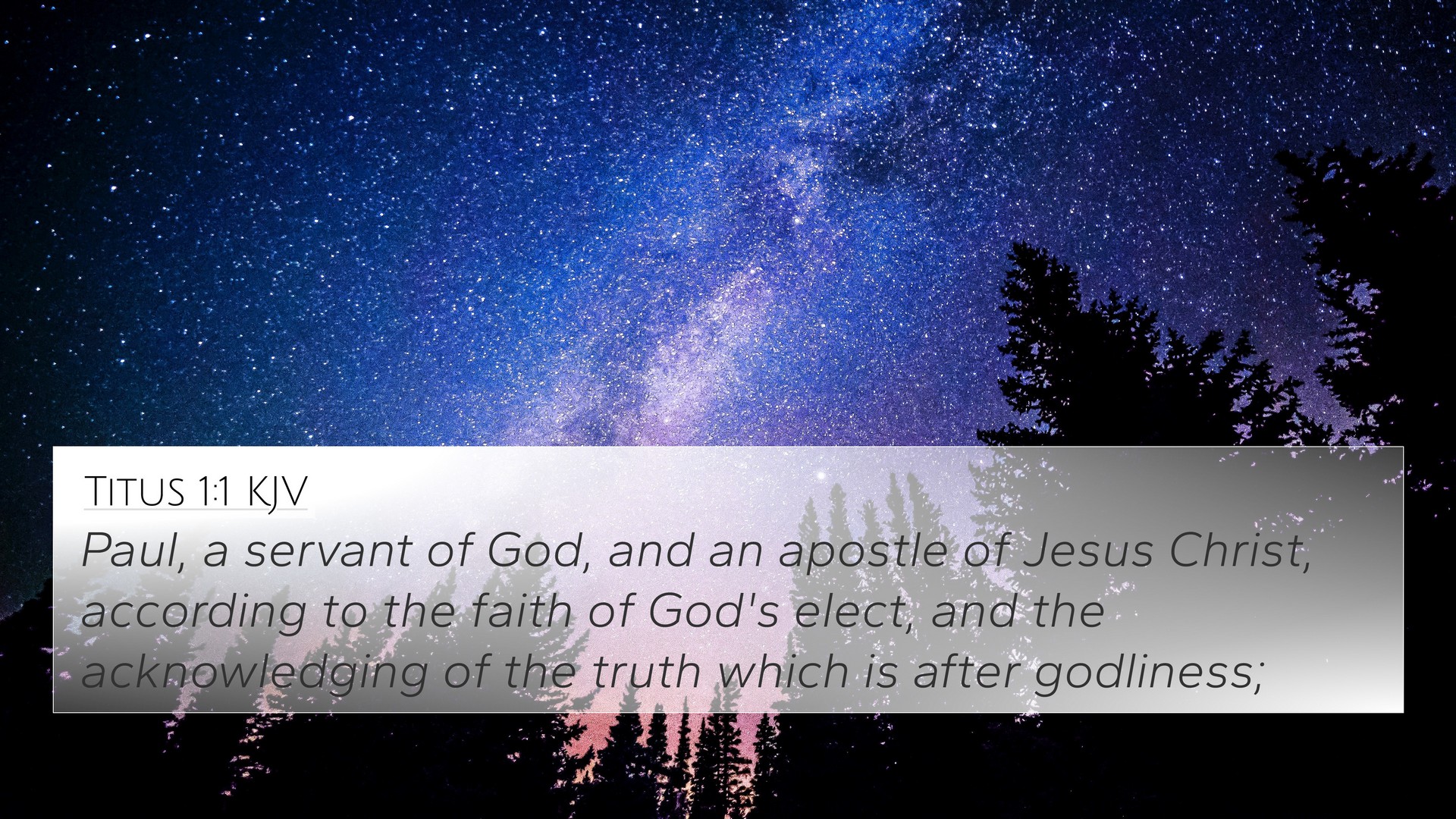Old Testament
Genesis Exodus Leviticus Numbers Deuteronomy Joshua Judges Ruth 1 Samuel 2 Samuel 1 Kings 2 Kings 1 Chronicles 2 Chronicles Ezra Nehemiah Esther Job Psalms Proverbs Ecclesiastes Song of Solomon Isaiah Jeremiah Lamentations Ezekiel Daniel Hosea Joel Amos Obadiah Jonah Micah Nahum Habakkuk Zephaniah Haggai Zechariah MalachiTitus 1:1 Similar Verses
Titus 1:1 Cross References
Paul, a servant of God, and an apostle of Jesus Christ, according to the faith of God's elect, and the acknowledging of the truth which is after godliness;
Uncover the Rich Themes and Topics of This Bible Verse
Listed below are the Bible themes associated with Titus 1:1. We invite you to explore each theme to gain deeper insights into the Scriptures.
Titus 1:1 Cross Reference Verses
This section features a detailed cross-reference designed to enrich your understanding of the Scriptures. Below, you will find carefully selected verses that echo the themes and teachings related to Titus 1:1 KJV. Click on any image to explore detailed analyses of related Bible verses and uncover deeper theological insights.

1 Timothy 6:3 (KJV) »
If any man teach otherwise, and consent not to wholesome words, even the words of our Lord Jesus Christ, and to the doctrine which is according to godliness;

Romans 1:1 (KJV) »
Paul, a servant of Jesus Christ, called to be an apostle, separated unto the gospel of God,

2 Timothy 2:23 (KJV) »
But foolish and unlearned questions avoid, knowing that they do gender strifes.

2 Peter 1:3 (KJV) »
According as his divine power hath given unto us all things that pertain unto life and godliness, through the knowledge of him that hath called us to glory and virtue:

2 Timothy 2:25 (KJV) »
In meekness instructing those that oppose themselves; if God peradventure will give them repentance to the acknowledging of the truth;

1 Timothy 2:4 (KJV) »
Who will have all men to be saved, and to come unto the knowledge of the truth.

1 Timothy 3:16 (KJV) »
And without controversy great is the mystery of godliness: God was manifest in the flesh, justified in the Spirit, seen of angels, preached unto the Gentiles, believed on in the world, received up into glory.

2 Thessalonians 2:13 (KJV) »
But we are bound to give thanks alway to God for you, brethren beloved of the Lord, because God hath from the beginning chosen you to salvation through sanctification of the Spirit and belief of the truth:

Colossians 2:2 (KJV) »
That their hearts might be comforted, being knit together in love, and unto all riches of the full assurance of understanding, to the acknowledgement of the mystery of God, and of the Father, and of Christ;

Philippians 1:1 (KJV) »
Paul and Timotheus, the servants of Jesus Christ, to all the saints in Christ Jesus which are at Philippi, with the bishops and deacons:

2 Peter 3:11 (KJV) »
Seeing then that all these things shall be dissolved, what manner of persons ought ye to be in all holy conversation and godliness,

1 Timothy 1:4 (KJV) »
Neither give heed to fables and endless genealogies, which minister questions, rather than godly edifying which is in faith: so do.

1 Chronicles 6:49 (KJV) »
But Aaron and his sons offered upon the altar of the burnt offering, and on the altar of incense, and were appointed for all the work of the place most holy, and to make an atonement for Israel, according to all that Moses the servant of God had commanded.

Ephesians 2:8 (KJV) »
For by grace are ye saved through faith; and that not of yourselves: it is the gift of God:

2 Corinthians 1:1 (KJV) »
Paul, an apostle of Jesus Christ by the will of God, and Timothy our brother, unto the church of God which is at Corinth, with all the saints which are in all Achaia:

Acts 13:48 (KJV) »
And when the Gentiles heard this, they were glad, and glorified the word of the Lord: and as many as were ordained to eternal life believed.

1 John 2:23 (KJV) »
Whosoever denieth the Son, the same hath not the Father: he that acknowledgeth the Son hath the Father also.
Titus 1:1 Verse Analysis and Similar Verses
Bible Verse Meaning: Titus 1:1
Titus 1:1 states: "Paul, a servant of God, and an apostle of Jesus Christ, according to the faith of God's elect, and the acknowledging of the truth which is after godliness."
This verse serves as an introduction to Paul's letter to Titus, establishing key themes of authority, faith, and the pursuit of truth. Here, we will explore its meaning through insights from public domain commentaries such as those by Matthew Henry, Albert Barnes, and Adam Clarke.
Verse Context and Overview
The Apostle Paul introduces himself, highlighting his dual role as a servant and apostle. This establishes both his humility and authority. He emphasizes his ministry's focus: the faith of God’s elect and the truth aligned with godliness.
Commentary Insights
-
Matthew Henry:
Henry notes that Paul's designation as "a servant of God" reflects his commitment to serve God rather than himself or worldly ambitions. His apostleship is not self-appointed but divinely ordained, reinforcing the legitimacy of his teachings. The emphasis on faith indicates the importance of belief in establishing a relationship with God, particularly for the "elect," those chosen for salvation.
-
Albert Barnes:
Barnes highlights that Paul associates his apostolic mission with the "faith of God's elect," indicating that the essence of his ministry is to nurture and uphold this faith. His mention of "acknowledging of the truth" underscores the vital role of truth in a believer's life, which is essential for living a godly life.
-
Adam Clarke:
Clarke elaborates on the phrase "according to the faith of God's elect" as a reference to the Church, which consists of believers chosen by God. Clarke emphasizes the connection between faith and godliness, suggesting that true faith naturally leads to a life of righteousness and adherence to the truth of the Gospel.
Thematic Analysis
This verse introduces key themes that are foundational throughout the epistle:
- Servanthood and Apostolic Authority: Paul's identity as both a servant and an apostle establishes a framework for church leadership, emphasising humility coupled with authority.
- Faith of the Elect: Paul asserts that his mission is rooted in promoting and strengthening the faith among believers, highlighting the concept of divine election.
- Truth and Godliness: The pursuit of truth is intimately connected to godliness, suggesting that a genuine acknowledgment of truth translates into a lifestyle that reflects God’s character.
Cross-References to Titus 1:1
Exploring cross-references enhances our understanding of this verse. Here are some relevant passages:
- Romans 1:1-5: Similar themes of servanthood and being called as an apostle are present.
- 2 Timothy 1:9: Paul speaks of being called according to God’s purpose and grace, aligning with the theme of divine election.
- 1 Peter 2:9: References the “chosen generation,” linking back to the idea of the elect in Titus 1:1.
- Ephesians 1:4: Discusses being chosen in Christ before the foundation of the world, reinforcing the concept of the elect.
- John 15:16: Jesus clarifies the role of chosen servants, affirming God’s initiative in ministry.
- 1 Timothy 6:3: The importance of teaching sound doctrine reflects the truth Paul aims to emphasize.
- Colossians 1:5: Talks about the hope laid up for us in heaven, aligning faith with a focus on eternal truths.
Connecting With Other Scriptures
Understanding the connections between Bible verses can greatly enrich one's study. Here are some methods for examining linkages:
- Tools for Bible Cross-Referencing: A variety of biblical tools, such as concordances, can help locate themes across scriptures.
- Comparative Studies: Engaging in themes present in Pauline epistles can unveil deeper theological insights.
- Inter-Biblical Dialogue: Exploring links and parallels between Old and New Testament passages can reveal a cohesive narrative of redemption.
Conclusion
Titus 1:1 establishes a foundational understanding of the Apostle Paul's ministry and the themes of faith, truth, and godliness. It serves as a reminder that authentic faith is not just a belief but an active acknowledgment of the truth that must manifest in a godly life. Through cross-referencing and thematic analysis, believers can deepen their understanding of this verse and its implications for their faith journey.




